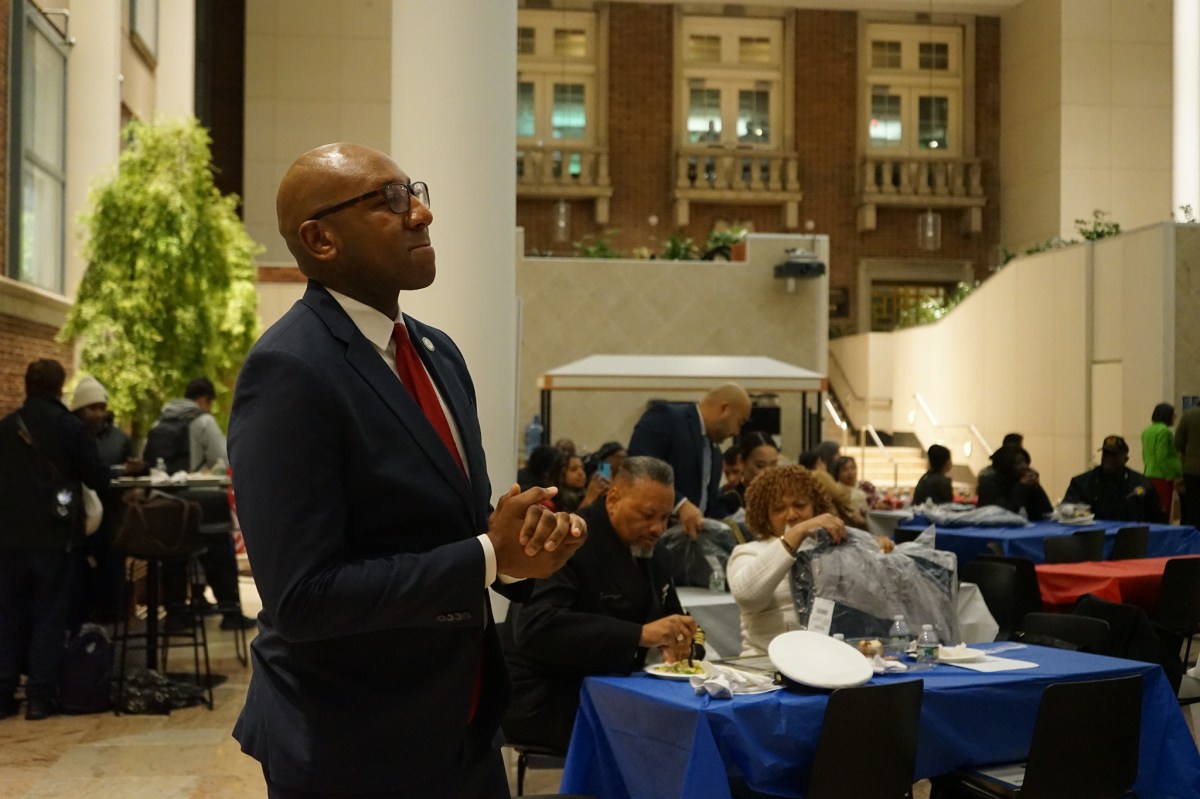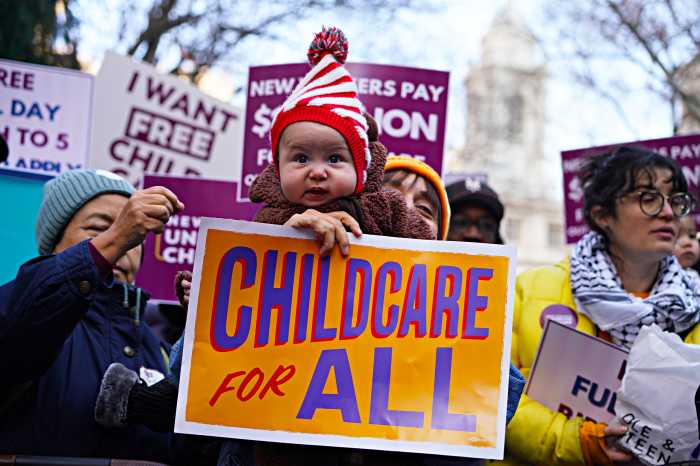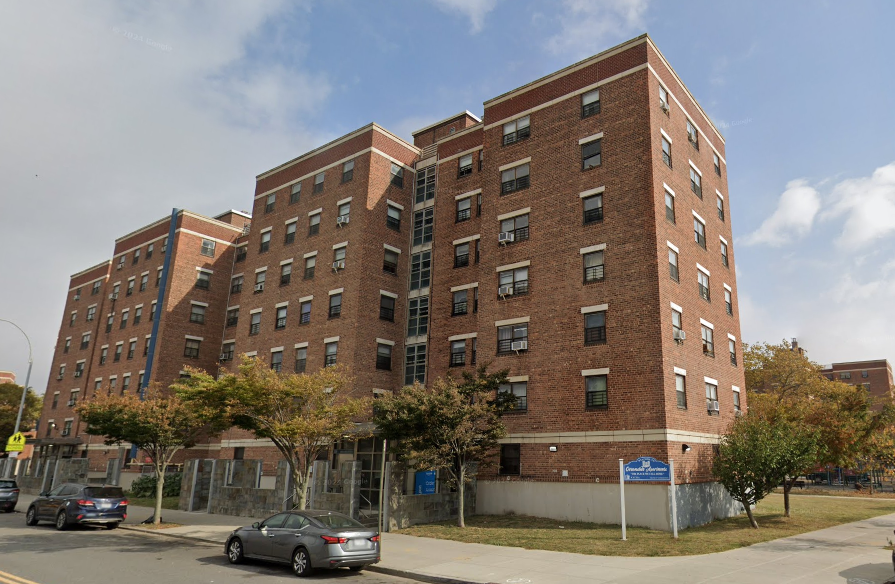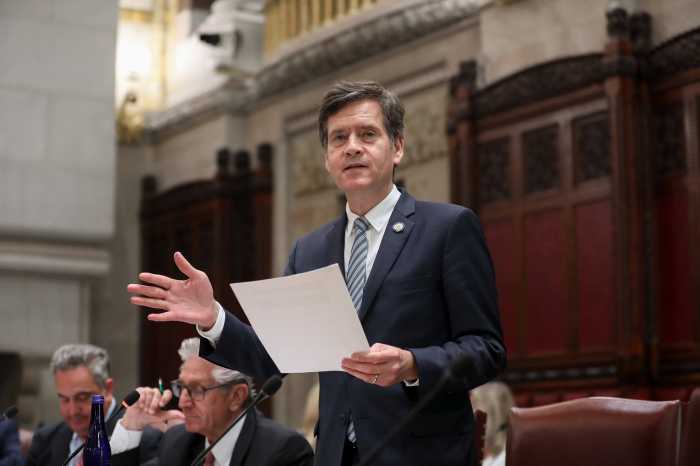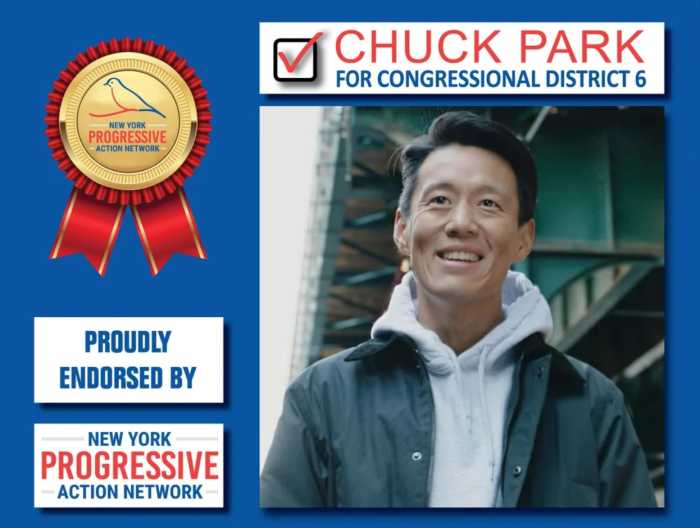Manhattan Borough President Mark Levine declared victory in the race for city comptroller after preliminary tallies from the New York City Board of Elections showed him with a commanding lead.
Levine joined his supporters as they gathered in force at his results watch party, which his campaign hosted in downtown Manhattan’s Houston Hall. Around 150 people cheered the results as Levine came out onto the floor.
Levine thanked supporters for their work, saying they were the reason he could champion his platform across the city.
“You gave the voters of this city hope that we can build affordable housing, we can fix the mental health system, fight back against the madman in the White House,” Levine said. “That was you.”
“New York, welcome to my bar mitzvah,” Levine added.
Initial voting results from the Board of Elections showed Levine leading Brooklyn City Council Member Justin Brannan, his chief rival, 48%-34%, with over 94% of in-person voting scanners reporting, as of 11:05 p.m.
The Associated Press has not yet independently called the election for Levine.
Levine told amNewYork he is most proud of the diverse coalition his campaign built.
“This is the diversity of New York at its best, from all five boroughs, all walks of life, all faith backgrounds,” Levine said. “We’ve come together because people are upset. They’re worried about the affordability crisis, about not feeling safe, about the threat from Trump, and we’ve come together to unite, to say New York can and must do better.”
Levine centered his comptroller campaign on defending New York City from federal overreach as fears over President Donald Trump dominated the race, as well as pledging to support affordable housing and quality of life issues.
Tibita Kaneene, whom Levine appointed to Manhattan’s Community Board 7, told amNewYork he attended the watch party because Levine is the strongest candidate for housing development.
“Levine supported more kinds of housing, including market-rate housing and affordable housing,” Kaneene said, comparing Levine to Brannan. “He has more creative solutions.”
“As borough president, he’s been a great partner for us all these years, and we’re excited about his candidacy,” Kaneene added. “I think he’d be a great comptroller.”
As Manhattan Borough President, Levine championed affordable housing — working with local councilmembers and city officials to identify sites for new developments — created a low-interest loan program for small businesses and launched a borough-wide tree-planting campaign.
Levine started his city political career representing Manhattan’s District 7 in City Council, chairing the council’s Committees on Parks and Health. Before politics, he worked as a bilingual math and science teacher in the South Bronx, which helped him earn the powerful endorsement of the United Federation of Teachers (UFT) on June 11.
Brannan, the progressive candidate endorsed by the Working Families Party, ran on a platform including universal free child care, divestment from Elon Musk-owned electric car company Tesla and tackling government corruption. Levine also battled state Sen. Kevin Parker (D-21) and city administrative worker Ismael Perez, whose campaigns had limited visibility next to Brannan and Levine’s contest.
“We were always going to be the underdogs, the working class, out-of-borough candidate up against the Manhattan elite,” Brannan said to supporters at his campaign party in Bay Ridge, Brooklyn. “Tomorrow, I will go back to work and continue being the Finance Chair because we have to pass a budget in a week, and I’m happy to do it, but I’m really excited tonight about Kayla.”
Levine will advance to the November general election, where the Democratic candidate is heavily favored in a city where Democrats outnumber Republicans six to one. If he wins, he will become the city’s chief financial officer, overseeing the city’s $112 billion budget, auditing every municipal agency and managing pension funds.
Levine said in his speech that he hopes to create a New York that is accessible to everyone.
“I have come to believe in the essential community of New Yorkers who have this common dream that they want to live in New York City and their family here to be a part of our family history,” Levine said.
This year’s primary was largely a contest between Brooklyn City Council Member Justin Brannan and Manhattan Borough President Mark Levine, both of whom campaigned as experienced fiscal stewards prepared to oversee a $115 billion budget, manage five pension funds, and audit the operations and performance of city agencies.
Brannan and Levine ended the race with comparable political support, with endorsements from elected officials, labor unions, and advocacy groups split down the middle. Limited public polling before June 24 showed Levine with a slight edge, but the margin tightened closer to election day.
Also appearing on the ballot were Brooklyn State Senator Kevin Parker and Ismael Malave Perez, an employee of the Department of Citywide Administrative Services. However, both ran campaigns that largely flew under the radar, failed to meet fundraising thresholds required to qualify for the official debates, and received a small share of the vote — Perez had 10.11% and Parker had 7.79%, respectively, according to the BOE’s preliminary count.




